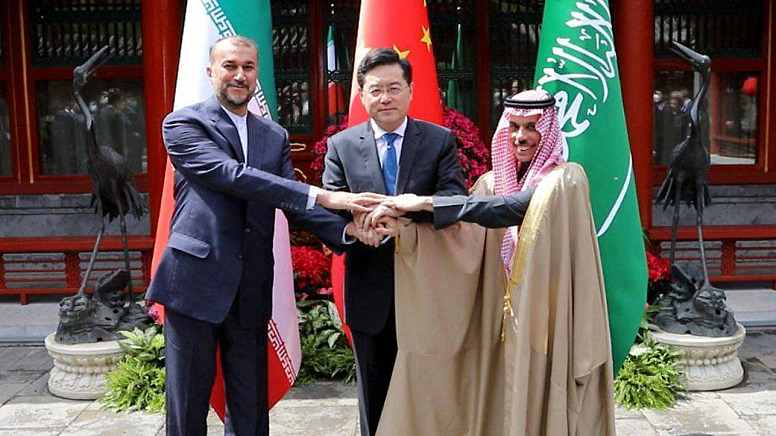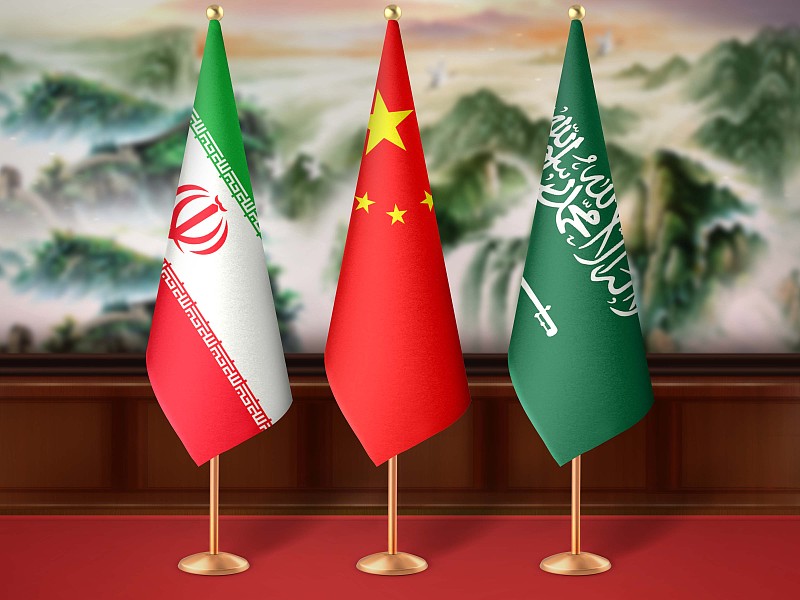
Iran's Foreign Minister Hossein Amir-Abdollahian (L) shakes hands with Saudi Foreign Affairs Minister Prince Faisal bin Farhan (R) and Chinese State Councilor and Foreign Minister Qin Gang during a meeting in Beijing, April 6, 2023. /CFP
Iran's Foreign Minister Hossein Amir-Abdollahian (L) shakes hands with Saudi Foreign Affairs Minister Prince Faisal bin Farhan (R) and Chinese State Councilor and Foreign Minister Qin Gang during a meeting in Beijing, April 6, 2023. /CFP
Editor's note: Bobby Naderi is a London-based journalist, guest contributor in print, radio and television, and documentary filmmaker. The article reflects the author's opinions and not necessarily the views of CGTN.
On April 6, China once again took a significant role as a mediator by hosting a meeting in Beijing between Prince Faisal bin Farhan Al Saud, Saudi Arabia's Foreign Minister, and Hossein Amir-Abdollahian, Iran's Foreign Minister. This came after a historic deal that China mediated in March to re-establish diplomatic ties and reopen embassies in each nation.
After more than seven years of hostilities and distrust, this was the first official encounter between the top diplomats of Saudi Arabia and Iran during which they signed an agreement for developing bilateral relations. Chinese State Councilor and Foreign Minister Qin Gang witnessed the signing ceremony.
The geopolitical ramifications of this true and hopeful development are massive and would extend well beyond the Middle East. The two regional powers have been embroiled in an unrestrained rivalry for many years, which has sparked intermittent conflicts and proxy wars.
Trustworthy and reliable
The ongoing wars in Syria and Yemen are two important issues where China has been actively involved in mediating between Iran and Saudi Arabia. Both nations have played a significant role in these conflicts by supporting opposing factions. China has been working behind the scenes to mediate these issues by getting both parties to the bargaining table.
This has encompassed diplomatic attempts to increase mutual trust and confidence as well as offering help for reconstruction projects in areas that have been devastated by war. For instance, China has promised to contribute to infrastructure development initiatives in Yemen and Syria, including ports, railways and roads, in order to open up new trade and economic prospects.
This has been influenced in part by China's growing economic links with Middle Eastern nations and its growing global influence. With significant investments in energy, infrastructure and other crucial industries, China is currently both Iran's and Saudi Arabia's largest trading partner. As a result, China now has considerable diplomatic sway, enabling it to take a more constructive part in settling disputes.
Ultimately, China is seen as a more trustworthy and reliable partner by the international community than the U.S. More and more nations in the Middle East are looking to China for diplomatic support as they regard it as a more neutral and unbiased mediator than the U.S., which is frequently seen as being biased.

Conflict mediation
China's role as a mediator between Iran and Saudi Arabia has profound geopolitical impact for the region's future. The fact that China is becoming more involved in settling old conflicts is a positive development that raises hopes for a more peaceful and stable future in the area, even though there are still many difficulties and barriers to be addressed.
The reality that choosing sides only serves to promote unrest and turmoil supports China's position on international conflicts. This has been seen in the ongoing crisis in Ukraine as well, where intervention by foreign powers has only served to raise tensions and prolong the war.
China's growing involvement in regional conflict mediation offers a chance to assess its vigilance and dedication to negotiating long-term peace agreements. The China-backed Saudi-Iran agreement to develop bilateral relations, in particular, demonstrates that China is willing to seize openings with its current mediation method.
In this context, China's intervention should be viewed as an opportunity by the U.S. government rather than a threat. Instead of purposefully undermining such efforts and adopting a defensive stance that exposes, above all else, discomfort and confusion in Washington, the U.S. government should look more into ways to assess and support China's strategic goals. This may help the U.S. interact with its allies more closely and demonstrate a greater understanding of their worries about the U.S.'s long-term commitment to regional security and interests.
Regrettably, the U.S. government has been slow to acknowledge the significance of China's diplomatic success as a Middle East mediator. In the past, the U.S. has used a unilateral strategy to settle disputes in the region, depending mainly on military power to accomplish its goals. This strategy has mostly failed, leading to recurrent conflicts and instability.
The U.S. needs to stop for a moment and understand how crucial it is to aid diplomatic attempts at conflict mediation that's truly needed to keep the Middle East viable for humanity. This entails collaborating closely with all parties involved to create an integrated plan for resolving issues. It also entails recognizing and utilizing China's remarkable diplomatic success at facilitating regional talks and aiding reconstruction projects that have become more urgent and significant than ever.
(If you want to contribute and have specific expertise, please contact us at opinions@cgtn.com. Follow @thouse_opinions on Twitter to discover the latest commentaries in the CGTN Opinion Section.)